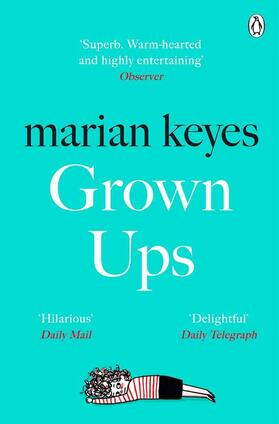| Three brothers in their forties gather periodically with their wives and children for holidays, weekend breaks and celebratory meals. On the surface, everything is rosy, but secrets threaten every marriage; will the extended family survive? I’d heard of this much-loved author but didn’t expect to pick up one of her books until an agent recommended them as a model for my own writing. Reading the prologue, I wondered how I’d plough through the next 600+ pages. |
It got better. Much better. I found the characters credible and admired how the author weaves their individual back stories and dilemmas into the main narrative (albeit she does give herself twice the length of an ordinary novel to do so). There’s a hilarious scene at a third-rate murder mystery weekend, a sensitive account of one woman’s struggle with an eating disorder and a nod to social (in)justice through a minor character who is a refugee. I liked it, but not enough to join her numerous fans.
I thought I’d get away with writing a review until a counsellor showed up. Peggy is more directive than my typical fictional therapist, but she’s the right person for a character in denial about her bulimia. My only criticism is her unwillingness to question her client’s lateness and request to leave early in any depth.
With strong writing, expert plotting, believable characters, humour and sufficient low-key jeopardy, it’s hard to pin down why didn’t enjoy it more. The agent I consulted said readers want characters they can identify with, but I didn’t identify with any of these. Maybe that’s the problem? In my reading I want something different to what’s popular and the general reader wants something different to what I write. I’ve enrolled for a course with the author in February, so perhaps I’ll learn more about that gap then.
The blurb from Caitlin Moran likens this novel to “reading the cleverest cream cake of words”. I have to agree, but I’m more likely to fancy a salad with a sourdough roll. Or something with a deeper question than how do families get along. What do you think?
| When I saw that the prompt for this week’s flash fiction challenge was recovery, I considered writing about recovery from mental health crises, inspired by both this novel and my previous work as a clinical psychologist. But currently there’s a much bigger recovery issue uniting most of the population of the UK. It’s not recovery from Brexit or the devastation of fourteen years of Tory misrule, where some still cling to delusions of success. It’s Britain’s most trusted brand, the Post Office. |
I’d read snippets of this major miscarriage of justice in the papers over the last few years and began researching it for possible novel at the end of last year. But, as it hadn’t had a great deal of media attention, I wondered whether it would be one of those true stories that are simply too incredible for fiction. Now, however, thanks to a TV drama that began screening on New Year’s Day, the whole country is outraged. It must be weird for these people who were vilified for years to suddenly discover everyone is on their side. I don’t know a single one of them personally but, simply thinking about it, has me tearing up. Of course, my 99-word story can’t do justice to what they’ve been through, but we have to hope this is a step towards recovery.
They came to recover the money they claimed I’d stolen. They believed the computer more than they trusted me.
For months I’d barely slept, trying to trace the error. Unless I approved the accounts, I couldn’t open. If I didn’t open, pensions couldn’t be paid. So I borrowed from family and my few remaining friends. Yet still they pursued me to court.
Now that the world knows I’m innocent, I can recover my reputation. But they stole more than that from me. I want the thousands they bullied me into handing over. I want the Chief Executive’s bonus pay.























 RSS Feed
RSS Feed





















